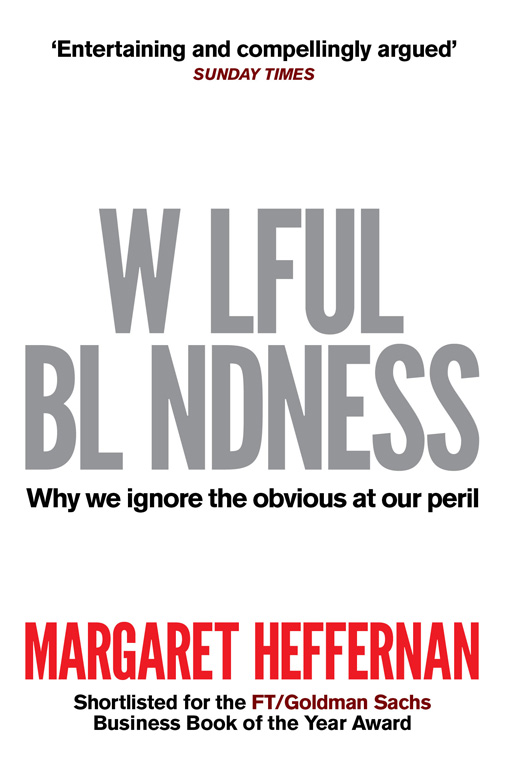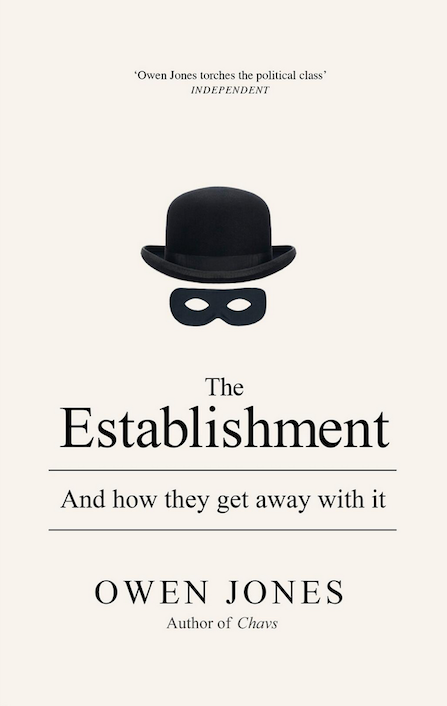 |
Wilful Blindness is when a person or people chose to deliberately pretend not to know about or ignore ethically dubious acts.
It happens on both a micro and macro scale. It spans all parts of society. It can have devastating consequences to both individuals and communities. Wilful Blindness was originally a legal term, but once Heffernan heard the term she started seeing Wilful Blindness everywhere. In our collective history of the past and in how governments and businesses operate today. Heffernan started talking to people, lots of people, from different professional backgrounds and they all knew what she was talking about. They were all able to give examples of Wilful Blindness in their lives. |
In Wilful Blindness, Heffernan identifies the causes and gives examples of the negative consequences of Wilful Blindness. She explains how to expand your mind to be less susceptible to the epidemic of Wilful Blindness.
Heffernan uses psychology to explain human behaviour when it comes to Wilful Blindness and suggests that:
- We like people that are the same or similar to ourselves. This can lead to blindness to difference and diversity and the benefits of the challenges that they bring.
- Love of people, ideas, money, things, values, can make us blind.
- Holding on to deeply held beliefs can mean we miss or ignore evidence that is contrary to these deeply held beliefs.
- Everyone’s mind has limits and these limits are stretched to make some very complex organisations, which make it difficult to see the truth or know what’s going on.
- We bury our head in the sand. We hope that difficult issues will go away. We even delude ourselves by not looking, acknowledging or talking about issues.
- We blame external sources for ethically difficult decisions and justify it to ourselves and other by stating: I was just doing my job.
- Cultures, conformity and the craving for acceptance from our peers can make us blind to other, broader or different perspectives.
- People that see what others are blind to and do nothing reinforce the status quo. Not only that, but they also imply through omissions that everything that makes up the status quo is acceptable.
- Physical distance from a situation or problem can lead to cognitive dissonance and make someone blind.
- Money and the removal of ethics from work makes people obey and conform. They are much less likely to notice issues or be brave enough to make a stand.
- People who challenge Wilful Blindess have a tough time. But common qualities in these people include: a sense of social justice, they are generally nonconformists, they are often trendsetters, they feel compelled to raise an uncomfortable truth, they have determination, a high level of resilience, they obsess about the truth and the truth others are ignoring, they have an eye for detail and are willing to suffer both personally and professionally to get others to see the truth.
Throughout Wilful Blindness Heffernan presents a compelling argument and engaging narrative, which is enhanced with fully referenced examples. Examples include: child abuse in the Roman Catholic Church, problems in BP, the banking crash caused by subprime mortgages and derivatives (2007-2010), the Nazis in World War 2 and post operative child deaths in Bristol.
Overall the book is a fascinating exploration of human psychology and why we often fail to see the obvious. If you’re interested in psychology, self-awareness, leadership or business you should read this book.
Review soon,
Antony





A great introductory article on candle magic :)
Hi Sofia, Thanks for the comment. I bought that in Glastonbury and he was a real find. I bought him…
Hi! I know this was posted ages ago and so a response may be rare but my dad has been…
Hi Ruth, Thanks for the comment. He might well have been. A x
Hi! Watching video and interviews with Charlie Watt, it had me wondering if he might have had Aspergers/ been on…